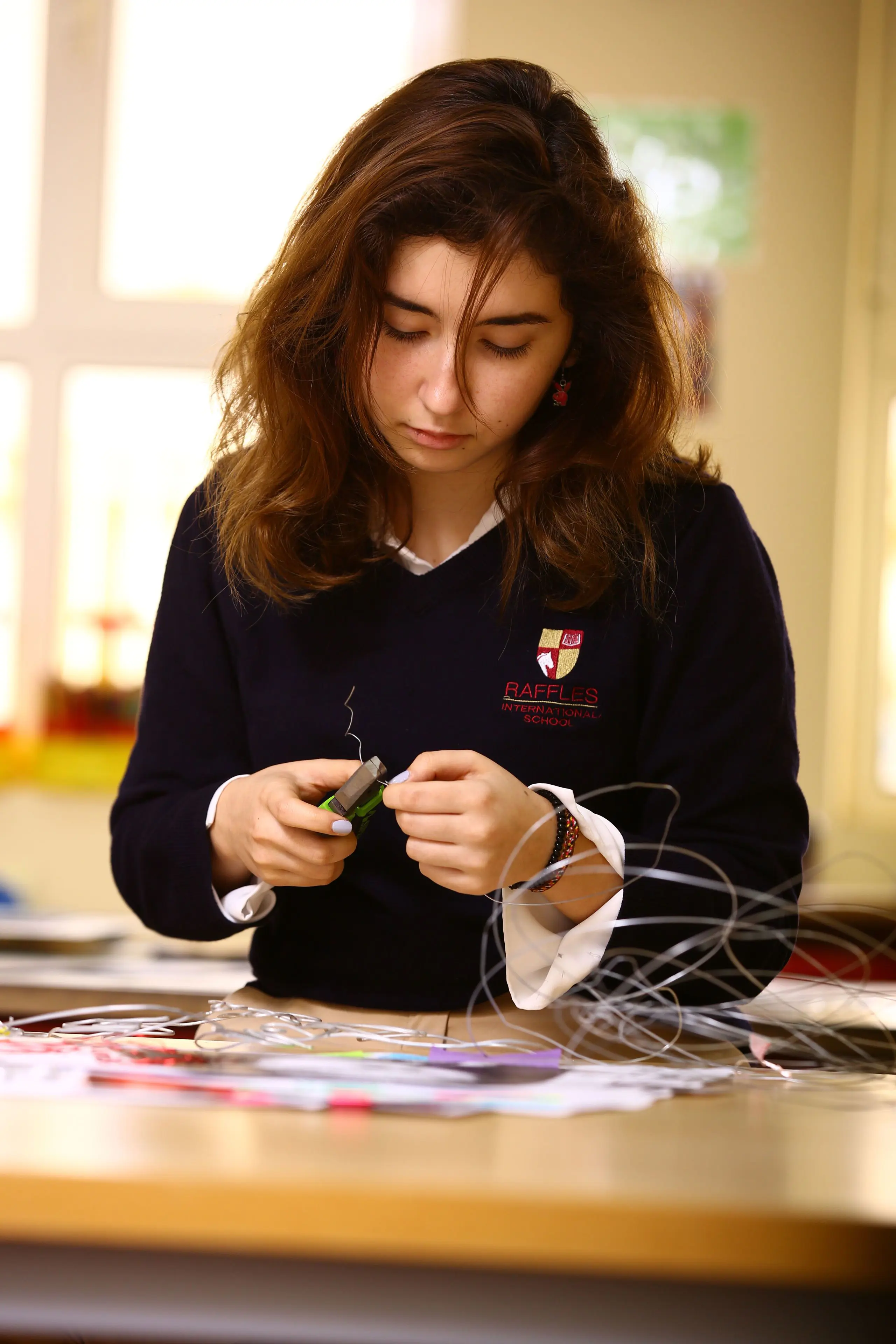sixth form
Having completed their IGCSEs, students are able to study A levels and/or BTEC qualifications (BTEC is a more vocational focused course leading to the same level of qualification). A broad range of A Level options is available and in keeping with our commitment to personalised pathways, subjects are regularly added where there is sufficient demand. As well as these subject options, students may opt to take Extended Project Qualification (EPQ).
Like Year 10 and 11 students, seniors meet their form tutor in the morning, then they join subject groups throughout the day depending on the personalised pathways they have selected.
Senior students play a large part in running the school. There is a school council, prefects, senior prefects and a senior student leadership team leading up to the head students. Senior students also are heavily involved in co-curricular activities which run every afternoon.
Sixth form curriculum

Universities make offers based upon grades. Therefore interest and performance are vital in choosing Sixth Form subjects. It is advisable to consult the UCAS website as some courses have special requirements, e.g. Medicine and Engineering. Career aims may also dictate a particular choice of subjects or, if serious study of a particular subject at a higher level is envisaged, it may be advisable to combine that subject with other complementary subjects. The A level programme allows plenty of breadth and pupils are strongly encouraged to take full advantage of this.
Some subjects do not require pupils to have studied the subject at GCSE level. They can be started from scratch provided that aptitude has been shown in a relevant GCSE subject. However, pupils need to be aware that starting one or more subjects with no prior background will require real commitment and hard work.
| arabic |
|---|
| arts and design (9704) |
|---|
Course Entry RequirementsTo study A-Level Art and Design students should have at least a Grade B in Art and Design at IGCSE or equivalent. Course Content (Year 12/AS)Cambridge International A Level candidates take four components over two years. In Year 12 students take Components 1 and 2.
Course Content (Year 13/A)Cambridge International A Level candidates take four components over two years. In Year 13 students take Components 3 and 4.
Exam StructureThis is an externally set examination that is marked by Cambridge. Candidates choose one question from the examination paper from which to make studies in ant suitable medium, process or technique. Candidates are expected to develop a visual response, observe directly from primary sources and record, analyse and develop their ideas in two and / or three-dimensions. Students are given a minimum of three weeks preparatory time and 15 hours in which to complete a final repose to their exam question. Examining BoardCambridge International Examinations (CIE) |
| BIOLOGY |
|---|
Course Entry RequirementsTo study Biology at A-Level students should have at least a Grade B in Biology at IGCSE or equivalent. Why Biology?Biology can lead to several career paths in fields such as engineering, agriculture, medicine and health care and research. Careers such as doctors, pharmacologists, biochemical engineers, nutritionists, forensic scientists, paramedics and personal trainers, to name just a few, have their roots in Biology Course content (Year 12/AS)Comprises of three units:
Course content (Year 13/A)Comprises of three units:
Exam StructureYear 12/AS:
Year 13/A2:
Examining BoardEdexcel Summer SuggestionsRead through the specification for more details of what is covered. Refresh on your IGCSE content as you will need it . |
| BTEC NATIONAL LEVEL 3 EXTENDED DIPLOMA IN BUSINESS |
|---|
Course entry RequirementsTo study BTEC Business students should have at least a Grade B in Business at IGCSE or equivalent. Students will also be considered if they have Grade B or above English. Why Business?For every career choice BTEC- Business will be relevant. The course is designed to encourage students to develop hands on entrepreneurship skills to business problems, apply concepts of Business to different contexts and develop this understanding relating to strategic planning and decision-making. Course Content (Year 12/AS)
Course Content (Year 13/A)
Exam StructureStudents will be assessed based on the course work. The vocational nature of the course means that you will be required to investigate and apply your knowledge to real businesses situations and gain appropriate work experience. Examining BoardEdexcel Pearson Summer SuggestionsStudents can keep up to date with the latest business news through business apps and websites such as BBC Business and The Economist as well as reading Business journals on Human resources, Entrepreneurship, leadership and business innovation. |
| BUSINESS ALEVEL (9609) |
|---|
Course Entry RequirementsTo study Business at A-Level students should have at least a Grade B in Business at IGCSE or equivalent. Students will also be considered if they have Grade B or above in Maths and English Why Business?Whatever career you choose to continue with, Business will be a relevant. The course is designed to encourage students to develop practical solutions to business problems, apply concepts of Business to different contexts and develop this understanding relating to strategic planning and decision-making. Course content (Year 12/AS)
Course Content (Year 13/A)
Exam structureStudents will sit 2 exams at the end of Year 12 (AS). Paper 1 is shortanswer and essay; Paper 2 is data-response. At the end of Year 13 (A-Level), students will sit Paper 3 which is worth 50% of the ALevel which lasts for 3 hours. Examining BoardCambridge International Examinations (CIE) Summer SuggestionsStudents can keep up to date with the latest business news through websites such as BBC Business and CNN Money as well as reading books. Entrepreneurship, leadership and motivation would be a good starting point |
| chemistry |
|---|
Course Entry RequirementsTo study Chemistry at A-Level students should have at least a Grade B in Chemistry at IGCSE or equivalent. Why Chemistry?From the moment you are born, and throughout your life, you are surrounded by chemistry – the air you breathe, the food you eat and the clothes you wear – they’re all chemistry. Chemistry is the study of substances; what they are made of, how they interact with each other and the role they play in living things. Whether you want to care for penguin colonies in Antarctica or work in a dynamic business environment, chemistry can help you achieve your goals. From research in space, to the depths of the oceans, chemistry helps you understand the world around you and opens up lots of career opportunities. Course Content (Year 12/AS)Comprises of three units:
Course Content (Year 13/A)Comprises of three units:
Exam StructureYear 12/AS:
Year 13/A2:
Examining BoardEdexcel Summer SuggestionsRead through the specification for more details of what is covered. Refresh on your IGCSE content as you will need it . |
| economics (9708) |
|---|
Course Entry RequirementsTo study Economics at A-Level students should have at least a Grade B in Economics at IGCSE or equivalent. Students will also be considered if they have Grade B or above in subjects that link to Economics such as Business, History or Geography Why Economics?Whatever career you choose to continue with, Economics will be all around you. The course is designed to encourage students to develop practical solutions to problems such as unemployment or change in oil prices, apply concepts of Economics to different contexts and develop this understanding relating to decision making of complex human issues. Course content (Year 12 and 13 - AS and A Level)The syllabus is divided into five topic areas which are covered equally across both years.
Exam StructureStudents will sit 2 exams at the end of Year 12 (AS). Paper 1 is multiple-choice; Paper 2 is data response and essay. At the end of Year 13 (A-Level), students will sit Paper 3 which is again multiple choice and Paper 4 which is data response and essays. Examining BoardCambridge International Examinations (CIE) Summer SuggestionsWatch the news and read the papers! Find out what is going on in the world of business, economics and politics. What are the politicians and the media saying about the world economy? What is happening to the value of currencies or to unemployment, or developments of trade deals in Europe or the rest of the world? |
| eNGLISH LANGUAGE |
|---|
Why English?The study of English Language provides an excellent grounding for life, providing skills that are greatly sought after by universities and employers alike. The aims of the course are: to develop and apply an understanding of concepts and methods; explore data and examples of language in use; independently investigate language in use; develop skills as producers and interpreters of language. Course Content (Year 12/AS)Unit 1: Context and Identity - Students will demonstrate critical understanding of concepts and issues, exploring attitudes to language and evaluating how an individual's language is affected by: mode, field, function, audience, geographical features and social factors. Unit 2: Language in Transition - introduces students to the ways languages change with a focus on English in a global context. Course Content (Year 13/A)Unit 3: Crafting Language- students will demonstrate their skills as writers, crafting texts for different genre, audience, purpose and context. Unit 4: Investigating Language students will develop their research skills , consolidating knowledge of language concepts gained from units 1, 2 and 3. Exam StructureEnd of unit external examinations - each of the 4 units is given equal weighting. Summer SuggestionsReading of work produced by David Crystal English Language Information | PDF |
| extended project qualification |
|---|
Why EPQ?The EPQ is a skills based project where students are given the freedom to explore an area of their own choosing. The EPQ consists of either a 5000 word essay, or a physical object related to a specific issue within an area of study. The EPQ forces students to develop their research, independence and project management skills. Universities especially value the EPQ because the skills required by universities – research skills, project management and independence are essential for all degree courses. It also is the only AS qualification to have an A* rating, and contributes to University UCAS points in the UK. The EPQ also helps students to:
Course content (Year 12/13)Students will:
Exam StructureNone – project is 100% coursework be completed by February/March of the Academic year Examining BoardEdexcel Summer SuggestionsStudents must have chosen a rigorous question to investigate and developed research using books, academic online sources and where appropriate primary sources / personal investigations before the start of the Academic year. |
| GEOGRAPHY (9696) |
|---|
Course Entry RequirementsTo study Geography at A-Level students should have at least a Grade B in Geography at IGCSE or equivalent. Students will also be considered if they have Grade B or above in Maths and/or Science. Why Geography?Geography is often chosen as one of the facilitating subjects of all A levels as it is one of the few subjects that combines both arts and science. The Geographer looks at the world over time, how cultures, systems, economies and landscapes differ and have links between them. Course content (Year 12/AS)
Exam structureStudents will sit 2 exams at the end of Year 12 (AS). Both are data response and structured questions. Paper 1 is Core Physical; Paper 2 is Core Human. At the end of Year 13 (A Level), students will sit Papers 3 and 4. These consist of structured questions and essays based in Advanced Physical and Advanced Human Geography topics. Examining BoardCambridge International Examinations (CIE) Summer SuggestionsStudents can prepare for the course by reading and researching current topics relating to Geography such as climate change and development through organisations such as the Royal Geographical Society and the Geography Review |
| HISTORY (9389) |
|---|
Course Entry RequirementsTo study History at A-Level students should have at least a Grade B in History at IGCSE or equivalent. Why History?The study of History provides an excellent grounding for life, providing skills that greatly sought after by universities and employers alike. History requires a high level of hard work and independent reading and study, however the rewards through the development of communication, analytical and judgment skills make History one of the most valued A levels on offer. Course Content (Year 12/AS)
Course Content (Year 13/A)
Exam StructureStudents will sit 2 exams at the end of Year 12 (AS). Paper 1 is a document question; Paper 2 is an outline study. At the end of Year 13 (A-Level), students will sit Paper 3 which is an interpretations question and Paper 4 which is depth study. Examining BoardCambridge International Examinations (CIE) Summer SuggestionsMartyn Housden, "The League of Nations and the organisation of peace" is a good starting text to prepare for the first component |
| Information Communication Technology (9626) |
|---|
Course Entry RequirementsTo study ICT at A-Level students should have at least a Grade B in ICT at IGCSE or equivalent. Why ICT?In a world where Information Technology (IT) is constantly changing, individuals increasingly need technological and information literacy skills that include the ability to gather, process and manipulate data. The impact of IT on society is enormous and as the percentage of businesses and households connected to communication networks such as the internet grows, so does the need for individuals who understand these new technologies. Course Content (Year 12/AS)Candidates for Cambridge International AS Information Technology study the following topics (1-10):
Course Content (Year 13/A)Candidates for Cambridge International A Level Information Technology study topics 1–10 and the following topics:
Exam StructureStudents will sit 2 exams at the end of Year 12 (AS). Paper 1 is a Theory Paper; Paper 2 is a Practical Paper. At the end of Year 13 (A-Level), students will sit Paper 3 Examining BoardCambridge International Examinations (CIE) Summer SuggestionsStudents can brush up on their IGCSE knowledge as A Level ICT uses the IGCSE content in every lesson. Use the Internet to find out how to bridge the digital gaps between countries that is leading in technology |
| international advanced level (IAL) Mathematics |
|---|
Course Entry RequirementsTo study Mathematics at A level students should have at least Grade 7 or Grade A at GCSE or IGCSE or equivalent. Why Mathematics?Mathematics is a versatile qualification, well-respected by employers and are both facilitating subjects for entry to higher education. The mathematical skills learned at A level Mathematics are of great benefit in other A level subjects such as physics, chemistry, biology, computing, geography, psychology, economics and business studies. Employers highly value mathematics qualifications as Mathematicians demonstrate the ability to think logically and analytically through solving problems. There are many opportunities for further study which could lead to higher education and a range of careers including accountancy, banking, chemistry, physics, Actuarial Science, medicine, computing, engineering and teaching. Course Content (Year 12 ad 13 - AS and A Level)Pure Mathematics 1, 2, 3 & 4
Statistics, Mechanics, Decision
Exam StructureAll papers carry equal weighting. Students will sit P1, P2 and one applied unit at the end of Year 12. Students will sit P3, P4 and the second applied unit at the end of Year 13. Examining BoardEdexcel Summer WorkAll students will be assessed on entry on basic GCSE mathematical skills needed for the course. There are also books that may be purchased to work through over the summer, "Bridging GCSE and A Level Maths Student Book (Collins A Level Maths)" is widely available and recommended. |
| international advanced level (IAL)physics |
|---|
Course Entry RequirementsTo study Physics at A-Level students should have at least a Grade B in Physics at IGCSE or equivalent. Why Physics?This course will give the students an opportunity to study a range of topics such as Electricity, Classical and Quantum Mechanics, Materials, Waves etc. This qualification enables students to develop a deep appreciation of the skills, knowledge and understanding of scientific methods and also develops competence and confidence in a variety of practical, mathematical and problem solving skills. The knowledge and skills that are achieved by studying Physics can lead to many careers including engineering, medicine, computing, banking and finance, research and teaching. Course content (Year 12/AS)
Course content (Year 13/A)
Exam StructureStudents will sit three exams at the end of Year 12 (IAS) and three exams at the end of Year 13. Papers include multiple choice, short-open, open response, calculations and extended writing questions.
Examining BoardEdexcel Summer SuggestionsHead start to A Level Physics (CGP Books) A Level Physics: Essential Maths Skills (CGP Books) |

The choice of courses is flexible up to a point and the school will endeavour to accommodate all requests. However, there are constraints on the timetable and parents and pupils need to be aware that there may be certain combinations of subjects that will not be possible to schedule. Where there are problems with a set of choices it will be necessary to discuss the available options with the Head of Sixth Form.




-1314.jpg_1314.jpg?version=638675347624430000)


